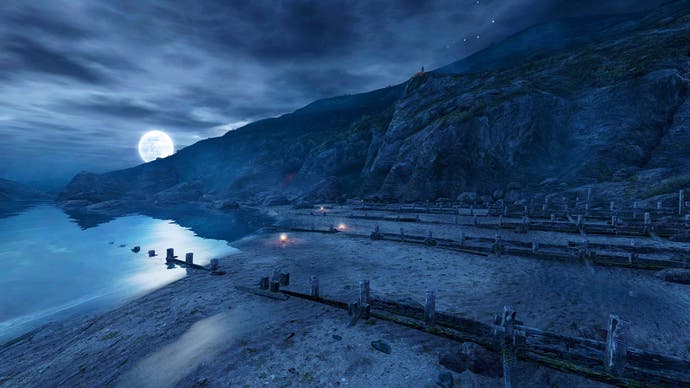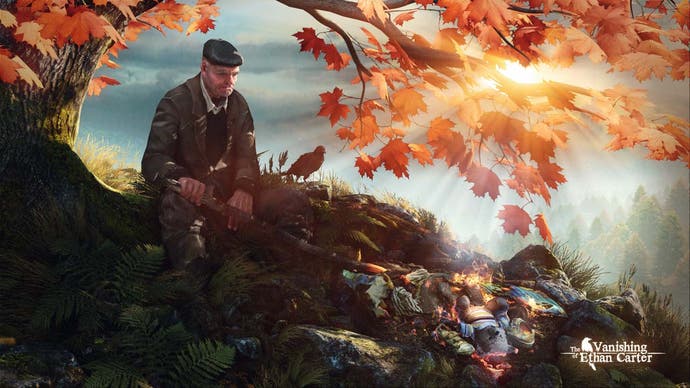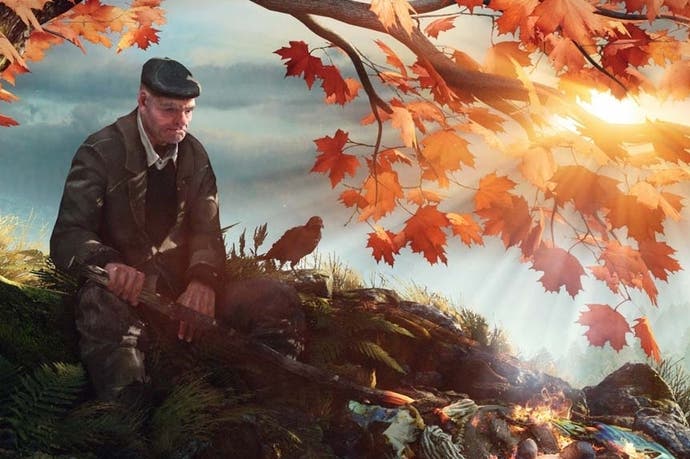"The next generation is going to be, possibly for the very first time, the next generation of game design"
Meet Adrian Chmielarz, the Bulletstorm guy whose world was turned upside down by Dear Esther.
"Why is Nathan Drake a mass murderer?" Oh I don't know, but it's the question not the answer that's important. It symbolises a seismic shift in attitudes towards games that may mean, "possibly even for the very first time", that the next generation of consoles also becomes "the next generation of game design".
Dun, dun, dunnnnnn.
Those are the strong opinions of born again game maker Adrian Chmielarz, he who took Polish studio People Can Fly to fame - to Bulletstorm and to Gears of War: Judgment - but who walked away after having an epiphany about game design and U-turning on the types of games he wants to make.
"Things are aligning in a way that, by the end of this generation, people started asking, 'Hey you know what, why is Nathan Drake a mass murderer?'" he tells me, talking openly at Polish conference Digital Dragons. "And they didn't ask that with the first Uncharted. They didn't ask that previously.
"Something happened and it was probably indie games and the fight of indie developers to show a different side of gaming. Some people tasted a little bit of that indie gaming, started thinking about games and then they go back to the old ways and go, 'OK there's something wrong here.'
"I could not imagine," he continues, "a situation where the lead writer for Tomb Raider has to explain herself in, let's say, 2005, about the ludonarrative dissonance that's in Tomb Raider, where she's [Lara Croft] like, 'Oh I'm a scared little girl,' and then she's like, 'Dff dff dff dff dff [a machine gun noise, obviously],' killing like a mass murderer five minutes later. But she's [writer Rhianna Pratchett] explaining herself and acknowledging the fact that, yeah, we need to do something about this - maybe we'll fail but, yeah, there's something there."
"BioShock Infinite is proof that the old territory is on fire and we need to go."
Adrian Chmielarz
Then along came BioShock Infinite, "proof that the old territory is on fire and we need to go". It is, as he's heard it excellently described, the "end of an era".
No game has ever sparked such a widespread debate about core game mechanics as BioShock Infinite did, Chmielarz says. Partly that's because it's a high profile blockbuster from a legendary game designer. "But also," he adds, "exactly because there are these moments there when you get a slice of heaven, a taste of heaven, and you go, 'Oh my god this is what games can be!' And then it's taken away from you for the majority of the game.
"But these moments are absolutely mind blowing - really really great - and you realise, oh my god, video games potentially can be so much more, so powerful."
And it's precisely because it does not deliver on the promise it dangles before you that BioShock Infinite becomes, for Adrian Chmielarz, the "ultimate proof" about what is wrong with game design today.
"You can't be focusing on the emotions narrative and new ways of narration and still be using these old devices and solutions," he declares, "so something has to change.

"So just as with Dear Esther - I don't think it is a good game, but it's an incredibly important game, and it's a point of reference in these discussions whenever you talk about not-games or this kind of movement - when everyone will be talking about what is wrong with game design, we will be bringing up BioShock Infinite."
"Think about a song you hear on a "beach radio", he instructs me, wheeling out a metaphor. When you take that song home and listen to it on expensive Hi-Fi equipment "that song is only going to get better". "It's still the same song, the same lyrics, everything is the same - it's just better. With games it's exactly on the contrary.
When the fidelity of games improves but the gameplay stays the same, "the gameplay begins to suffer". "You start to be bothered by all the little things that are very gamey," he says. "I enjoy collecting coins in Mario - that's brilliant, I love it, I want to collect all the coins in Mario. But I don't want to collect the coins in a game that's about redemption.
"That was the reason we brought it on ourselves, because we have increased the quality of everything but not our designs. This dissonance happened and people started asking questions, as I said, so when I say things are starting to align themselves, it's the next generation of consoles, because we're not going to get worse at the audiovisual presentation - it's going to be insane, it's going to be mad."
(He says the real limiting factor in current-generation machines wasn't the power, "it was the memory". "Give me the same processor but give me 8GB of memory; you would see games on 360 or PS3 you would not believe," he said. "We get that next generation.")
Gameplay will have to improve because the gulf between it and audiovisual presentation simply cannot get any bigger. It will have to catch up. "The designs will change because they will have to change. We are running out of options," he says. "The old ways they no longer work.
"If people are truly being bothered by the fact that Drake kills 400 men during the course of the game - that was the beginning - then these questions start popping up more and more, like the BioShock Infinite discussion. Suddenly everything is wrong.
"We're going to hear more and more about it if people keep the old designs while making next-generation presentations. The designs will have to change, no matter what, so the next generation from that point of view is going to be also, possibly even for the very first time, the next generation of game design."
What's he doing about it?
"It would be lame and truly annoying if I did not follow through with my own proposals."
He's making a game called The Vanishing of Ethan Carter, a mystery adventure game that sounds dark and violent but will have no combat in it. The Astronauts is only a small studio, so it's a modest production, but an American writer - "a name that people recognise" - has been drafted in, and the hope is to get the game out this year, although he's prepared to hold it back if it isn't ready. You lot know more than most how damaging releasing an undercooked game can be, he says. Plus, he's got to produce the goods to back up all this talk.
"I disagree with a lot of solutions that we're using in game design. It would be lame and truly annoying if I did not follow through with my own proposals," he acknowledges. "Ultimately I need to have a counter-proposal and say OK, these solutions would work better.
"The bad news is, well, that is not easy. We spent the last 30 years just slowly evolving one model of gameplay, and if we want to change the paradigms, it's terra incognita [unknown land], so I spent the last six months thinking about what this can be.
"I'm not saying that we're done but fortunately I see the light at the end of the tunnel, finally. Look, I'm not alone and I'm not the first who has these problems. I've learned a lot from guys like Thomas Grip from Frictional Games, or even David Cage," who he says "is a genius". Fahrenheit was "such an incredibly groundbreaking title" that even though "the story fell apart" towards the end, "the beginning, the opening, that one hour, that was a milestone". It's people like David Cage and Thomas Grip and Chris Hecker who are the "pioneers" Adrian Chmielarsz is steered by.
"The bad news," he adds, "is that after six months I still don't have a solid design, we still have not solved everything. But we have solved most of it."
"The power of the message that's there in Ethan Carter basically hits them like a brick wall..."

He's passionate and intelligent but he's concerned with coming across too strongly, and warns me that "I don't want to sound like this is going to be a revolution". "We're a small team making a small game," he says. "I still think that it's going to be something Chris Hecker calls 'triple-A indie', when it comes to the presentation of the game - it will look really good and the audio and the quality of the writing and everything will be, I hope, top-notch - but we're still a small team. I think it will be a step towards the right direction rather than a revolution like Dear Esther."
Exactly what you'll do in Vanishing I'm not sure. It sounds a bit like a murder mystery, but Chmielarsz is reluctant to say much more "because I feel like whatever we're showing is a spoiler" - think of Dear Esther with gameplay and corpses, he jokes. It will have simple controls, his argument being that "by limiting the options, you can evoke that feeling of freedom", and he wants people to think more about the experience they're having rather than how to control it.
He knows the effect he wants his game to have on you, too: "I want the players to have an experience," he says, and for you to forget you're playing a game and to feel, at the end, "smaller than when you started". Not in a bad way - in a humbled way.
"I'm talking like the power of the message that's there in Ethan Carter basically hits them like a brick wall and it's like 'OK, not only was I truly immersed in a different reality and it didn't feel like a game ... but at the same time there was a certain depth to it that makes you reflect on either your own life or with the surrounding.
"I don't want to sound pretentious," he adds, catching himself again, "I mean, this thing it's a very layered production - what you get out of it depends on you. If you're looking for a mystery story, yeah you will find it there - you don't really need to reflect on anything, although I hope it would be impossible [not to] ... but if you start digging then for the second layer of the game, you won't have to dig deep, so you will see that maybe this game had a little bit more to say than just offering a fun time.
"Basically," he concludes, "long-story short: if it stays with you a year later, I would be ecstatic."










